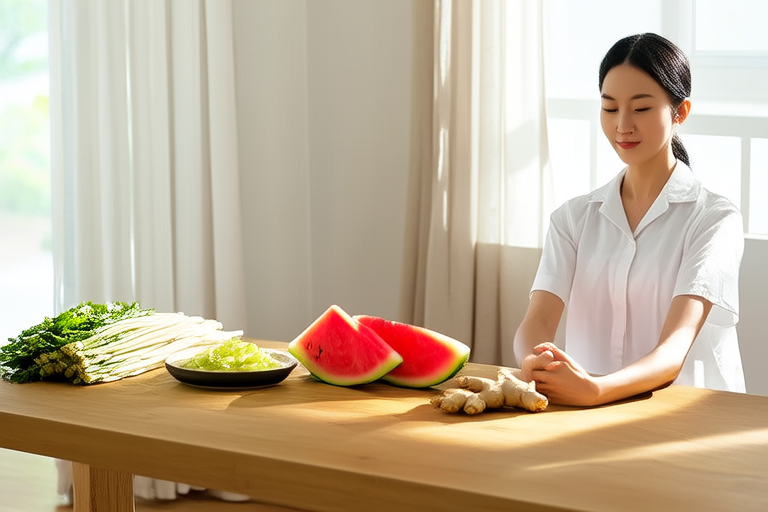Stay Healthy with the Seasons: Effective Health Preservation Methods for Spring, Summer, Autumn, and Winter
As the seasons change, so too should our approach to maintaining optimal health. Each season brings unique challenges and opportunities that require adjustments in our diet, exercise routines, sleep patterns, and preventive measures against common ailments. This article will explore effective health preservation methods for spring, summer, autumn, and winter, providing you with practical advice to stay healthy year-round.
Spring: A Time of Renewal and Growth
Spring marks the beginning of longer days and warmer weather, offering a fresh start for both nature and ourselves. This season is ideal for revitalizing your body after the cold months, boosting your immune system, and preparing for the upcoming heat of summer. Here are some ways to maintain your health during spring:
Dietary Recommendations
With the arrival of spring, it’s time to incorporate more fresh produce into your diet. Fruits and vegetables that thrive in this season, such as leafy greens, asparagus, and strawberries, provide essential vitamins and minerals that support overall health. Incorporating these foods can help improve digestion, boost energy levels, and enhance skin health. Additionally, consider adding ginger and turmeric to your meals, as they have anti-inflammatory properties that can aid in reducing seasonal allergies.
Exercise Tips
Spring is the perfect time to resume outdoor activities after the long winter months. Engaging in regular physical activity, such as walking, jogging, or cycling, can help you shed excess weight gained over the winter and improve cardiovascular health. Aim for at least 150 minutes of moderate aerobic activity or 75 minutes of vigorous activity per week, along with muscle-strengthening exercises on two or more days. As the days grow longer, try to take advantage of the increased daylight by exercising outdoors in the morning or evening to enjoy the fresh air and sunshine.
Sleep Advice
During spring, it’s important to adapt your sleep schedule to the changing daylight hours. Try to go to bed and wake up at consistent times each day to regulate your internal clock. Since the days are getting longer, you may find yourself naturally waking earlier. If you struggle with early awakening, consider creating a relaxing bedtime routine to signal to your body that it’s time to wind down. Avoid screens and stimulating activities at least an hour before bedtime, and create a comfortable sleeping environment with appropriate temperature, lighting, and noise levels.
Precautions Against Common Ailments
Spring is a time when many people experience allergies due to increased pollen counts. To minimize symptoms, keep windows closed during peak pollen hours (usually mid-morning and early evening), and shower and change clothes after spending time outside. Regularly clean your home, especially areas where dust and pollen tend to accumulate, like carpets and drapes. If necessary, consult with a healthcare provider about allergy medications or immunotherapy options.
Summer: Embrace the Sun and Stay Cool
Summer is a season of fun in the sun, outdoor adventures, and relaxation. However, it also poses unique health risks, particularly related to heat exposure and hydration. By following these guidelines, you can enjoy the summer while protecting your health:
Dietary Recommendations
Summer calls for light, refreshing meals that are easy to digest. Focus on eating plenty of fruits and vegetables, which are high in water content and nutrients. Watermelon, cucumbers, and berries are excellent choices for staying hydrated and nourished. Incorporate lean proteins like grilled chicken or fish into your diet to ensure adequate nutrition. Remember to drink plenty of water throughout the day, especially if you’re spending time in the heat.
Exercise Tips
Summer provides ample opportunity for outdoor exercise, but it’s crucial to stay cool and avoid overheating. Opt for morning or evening workouts when temperatures are cooler, and choose shaded areas or indoor facilities during the hottest parts of the day. Swimming is an excellent low-impact exercise that keeps you cool while building strength and endurance. Regardless of your chosen activity, always wear sunscreen and protective clothing to shield your skin from harmful UV rays.
Sleep Advice
Summer’s longer days and warmer nights can disrupt sleep patterns. To maintain good sleep hygiene, keep your bedroom cool and dark, even during the early mornings. Use blackout curtains or eye masks if necessary. Consider using a fan or air conditioning to lower room temperature, as excessive heat can interfere with sleep quality. Establish a relaxing pre-sleep routine that includes calming activities like reading or meditation to prepare your mind for rest.
Precautions Against Common Ailments
Heat exhaustion and dehydration are significant concerns during the summer months. To prevent these issues, stay well-hydrated by drinking fluids regularly, even if you don’t feel thirsty. Avoid alcohol and caffeine, as they can dehydrate you further. Be mindful of signs of heat-related illnesses, such as dizziness, nausea, or confusion, and seek medical attention if needed. Protect yourself from insect bites by wearing long sleeves and pants when possible and applying insect repellent containing DEET or picaridin.
Autumn: Preparing for Cooler Weather
Autumn signals the transition from warm to cooler temperatures, bringing with it new health considerations. As the leaves change color, it’s essential to adjust your habits to support your immune system and maintain overall wellness:
Dietary Recommendations
Incorporate warming foods into your diet to combat the chill in the air. Root vegetables, squash, and pumpkin are great sources of fiber and vitamins that promote digestive health and provide antioxidants. Soups and stews made with seasonal ingredients offer comforting warmth and hydration. Include spices like cinnamon, nutmeg, and ginger to add flavor and potential health benefits. Don’t forget to increase your intake of vitamin D-rich foods, such as fatty fish, eggs, and fortified dairy products, since sunlight exposure decreases as days shorten.
Exercise Tips
As the weather cools, outdoor activities may become less appealing. However, maintaining an active lifestyle remains vital for physical and mental health. Explore indoor exercise options like yoga, Pilates, or group fitness classes to stay motivated. Consider joining a gym or community center for access to equipment and structured programs. Outdoor activities, such as hiking or walking, can still be enjoyable if done during milder times of the day, such as early morning or late afternoon.
Sleep Advice
The shorter days of autumn can affect your circadian rhythm, potentially leading to disrupted sleep. To combat this, establish a consistent sleep schedule, going to bed and waking up at the same time every day. Create a bedtime routine that promotes relaxation, such as taking a warm bath, listening to soothing music, or practicing deep breathing exercises. Limit exposure to electronic devices before bed, as blue light can interfere with melatonin production and make it harder to fall asleep.
Precautions Against Common Ailments
Cold and flu season begins in earnest during autumn. Strengthen your immune system by washing your hands frequently, avoiding close contact with sick individuals, and getting vaccinated against influenza. Keep your living space clean and well-ventilated to reduce the spread of germs. If you develop symptoms, rest and stay hydrated to aid recovery. Over-the-counter remedies can help alleviate discomfort, but consult a healthcare provider for severe cases.
Winter: Navigating Cold and Dark Days
Winter presents its own set of challenges for maintaining health, including reduced sunlight, colder temperatures, and increased risk of respiratory infections. Follow these tips to stay healthy throughout the coldest months:
Dietary Recommendations
Eat a balanced diet rich in whole grains, lean proteins, and healthy fats to provide sustained energy and support immune function. Increase your intake of vitamin C through citrus fruits, bell peppers, and broccoli to bolster your defenses against illness. Omega-3 fatty acids found in fish, flaxseeds, and walnuts can help reduce inflammation and support heart health. Warm, nourishing soups and stews are ideal for keeping you warm and hydrated during the colder months.
Exercise Tips
Regular exercise is crucial for maintaining physical and mental well-being during winter. Indoor activities like weightlifting, dancing, or playing sports can keep you active and engaged. Snowshoeing, ice skating, or skiing are enjoyable ways to stay fit while enjoying the outdoors. Whatever your choice of exercise, aim for at least 150 minutes of moderate-intensity activity per week. Dress appropriately for outdoor activities to stay warm and dry, and wear layers that can be easily removed as you warm up.
Sleep Advice
Shorter days and darker evenings can impact sleep quality. To improve your sleep, ensure your bedroom is conducive to rest by keeping it cool, quiet, and free from distractions. Invest in quality bedding and pillows to enhance comfort. Use light therapy lamps or spend time outside during daylight hours to help regulate your internal clock. Maintain a consistent sleep schedule, even on weekends, to support your body’s natural rhythms.
Precautions Against Common Ailments
Respiratory infections are more prevalent during winter due to colder temperatures and increased indoor time. Practice good hygiene by covering your mouth when coughing or sneezing and washing your hands frequently. Disinfect commonly touched surfaces to reduce the spread of germs. If you experience symptoms of a respiratory infection, consult a healthcare provider for appropriate treatment. Staying physically active and managing stress can also help protect against illness.










